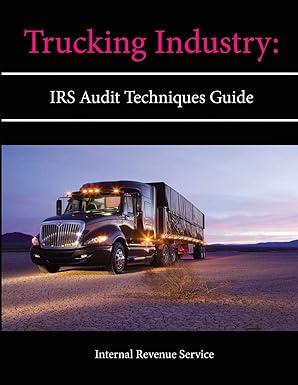Question
Framework Problem #1 Following is the definition of an asset from three sources: 1. FASB Concept Statement No. 6, paragraph 25 Assets are probable future
Framework Problem #1
Following is the definition of an asset from three sources:
1. FASB Concept Statement No. 6, paragraph 25 Assets are probable future economic benefits obtained or controlled by a particular entity as a result of past transactions or events.
2. IASB Framework, paragraph 49(a) An asset is a resource controlled by the entity as a result of past events and from which future economic benefits are expected to flow to the entity.
3. The Working Groups working definition as of October 2008 (the Working Group is the group working on the Joint Project of the IASB and FASB on Conceptual Framework (Phase B Elements and Recognition)) An asset of an entity is a present economic resource to which the entity has a right or other access that others do not have.
Accompanying text will amplify the asset definition by describing present, economic resource, and right or other access that others do not have: Present means that on the date of the financial statements both the economic resource exists and the entity has the right or other access that others do not have. An economic resource is something that is scarce and capable of producing cash inflows or reducing cash outflows, directly or indirectly, alone or together with other economic resources. Economic resources that arise from contracts and other binding arrangements are unconditional promises and other abilities to require provision of economic resources, including through risk protection. A right or other access that others do not have enables the entity to use the economic resource and its use by others can be precluded or limited. A right or other access that others do not have is enforceable by legal or equivalent means.
Required: Read each definition and compare and contrast the FASB and IASB versions and then compare to the Working Groups definition.
Review the following items and evaluate if they should be recorded as an asset under the Working Groups definition. Focus on present economic resource and right or other access in your analysis: Accounts receivable from a past sale Uncollectible accounts receivable Accounts receivable arising from future sales by an established business Raw materials for inventory Proven oil reserves Goodwill Leased asset Research costs incurred in the development of a new product Website Three-year employment contract with CEO Futures contract to purchase raw materials in two years at todays price
| " present economic obligation" | " entity is obligor" | ||
| Asset | |||
| Items | Yes or No | Yes or No | Yes or No |
| Accounts receivable from a past sale | |||
| Uncollectible accounts receivable | |||
| Accounts receivable arising from future sales by an established business | |||
| Raw materials for inventory | |||
| Proven oil reserves | |||
| Goodwill | |||
| Leased asset | |||
| Research costs incurred in the development of a new product | |||
| Website | |||
| Three-year employment contract with CEO | |||
| Futures contract to purchase raw materials in two years at todays price |
Step by Step Solution
There are 3 Steps involved in it
Step: 1

Get Instant Access to Expert-Tailored Solutions
See step-by-step solutions with expert insights and AI powered tools for academic success
Step: 2

Step: 3

Ace Your Homework with AI
Get the answers you need in no time with our AI-driven, step-by-step assistance
Get Started


